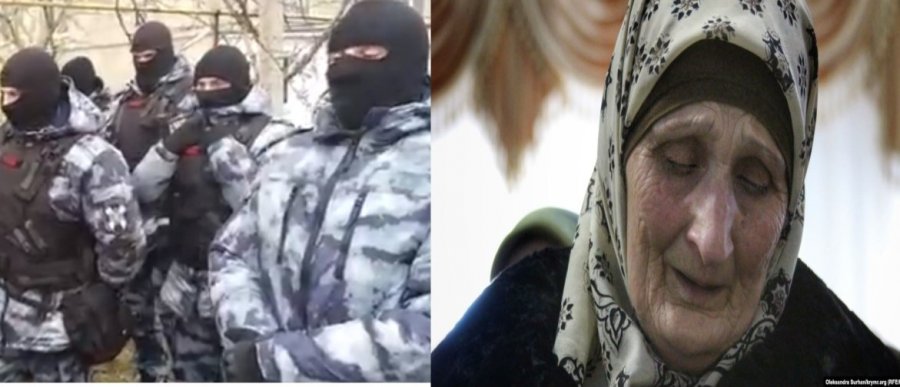EU sanctions ‘judges’ and others involved in the repression Russia brought to occupied Crimea

The European Union has imposed sanctions on eight individuals, all implicated in Russia’s persecution of Crimean Tatars and other Ukrainians in occupied Crimea. The list includes four ‘judges’, the heads of the FSB and of the central body of the Investigative Committee in occupied Crimea, as well as an investigator and Russian prosecutor. This is a welcome move, but hopefully only the beginning as the list of deserving candidates is considerably longer. It is important that all those who take part in political and religious persecution understand that this will carry consequences.
The European Council of the EU stated on 11 October that the sanctioned individuals “include law enforcement officials - judges, prosecutors and security officers - responsible for enforcing Russian law in the illegally-annexed Crimea and Sevastopol. Those individuals have taken biased decisions in politically-motivated cases, and prosecuted or oppressed opponents of the illegal annexation of Crimea and Sevastopol.”
Counting the new individuals, the EU now has sanctions against 185 persons and 48 entities. “Those designated persons are subject to an asset freeze – including a prohibition on making funds available to them - and a travel ban, which prevents them from entering or transiting through the EU.”
The four judges, as spelled on the list, are: Mikhail Nikolaevich Belousov; Andrey Nikolaevich Dolgopolov; Viktor Anatolyevich Mozhelianskiy and Galina Vladimirovna Redko All are Ukrainian nationals, who in 2014 betrayed their oath to Ukraine, and all have been involved in multiple political ‘trials’.
All four were involved, for example, in the so-called ’26 February case’. These were evidently politically-motivated arrests and ‘trials’ of Crimean Tatars over the pre-annexation demonstration in support of Ukrainian unity on 26 February 2014. The demonstration thwarted Moscow’s attempt to stage an effective coup without the obvious use of soldiers and is probably one of the reasons why repression against the Mejlis of the Crimean Tatar people and Crimean Tatars generally has been so ferocious. The charges, about a demonstration that undoubtedly took place on Ukrainian territory and under Ukrainian law, were legally absurd, and lacking in any factual basis. There was also clear discrimination, with only Crimean Tatars targeted, although the violence that day largely came from pro-Russian activists.
At least three of the ‘judges’, although probably also Dolgopolov, have also taken part in hearings which invariably extend the detention of men facing profoundly flawed charges of involvement in Hizb ut-Tahrir , the peaceful pan-Islamist party which is legal in Ukraine and most countries. All men arrested on these charges are recognized as political prisoners by the Memorial Human Rights Centre and their release has been demanded in numerous UN, EU and other international resolutions.
Mozhelianskiy was also the ‘judge’ who convicted Oleksandr Kostenko on surreal charges linked with Euromaidan in Kyiv before annexation. Not only were the charges lawless, but Mozhelianskiy also ignored clear evidence that Kostenko’s initial ‘confession’ had been tortured out of him.
The European Commission has doubtless seen evidence of such cases, however confines itself to a general statement in each case, namely that s/he “took multiple biased decisions in politically motivated cases against opponents of the illegal annexation of Crimea and Sevastopol. S/he thereby actively supported actions and implemented policies that undermine or threaten the territorial integrity, sovereignty and independence of Ukraine.”
Magomed Farmovich Magomedov is a ‘special cases investigator’ for the Investigative Committee’s Directorate for Investigation of Particularly Important Cases. Little is known about him so he is presumably a Russian brought to Crimea. He has also been involved in many political cases, including the lawless ‘trials’ in absentia of veteran Crimean Tatar leader Mustafa Dzhemilev and of the Chair of the Mejlis, Refat Chubarov.
Two Russians holding high-ranking posts have also been added: Leonid Vladimirovich Mikhailiuk, head of the FSB in Crimea and Sevastopol and of the regional Anti-Terrorism Committee; and Vladimir Nikolaevich Terentev, Head of the Main Investigation Department of the Investigative Committee in Crimea.
One of the individuals is a Russian working in Russia. Yevgeny Kolpikov is a prosecutor who has taken part in many ‘trials’ of Crimean Tatars and other Ukrainians, all of whom have faced huge sentences without any crime. It is he and other such prosecutors who invariably oppose any attempts by the defence to properly question and / or identify the so-called ‘secret witnesses’ upon whose unverifiable ‘testimony’ sentences of up to 20 years depend. In the trial of five Crimean Tatar journalists and activists, Kolpikov has played a major role in pushing falsified ‘evidence’, including via ‘secret witnesses’, as well as in abetting the FSB by refusing to examine proof of civic activist Rayim Aivazov’s account of torture and to reject the ‘confession’ which he retracted as soon as allowed access to an independent lawyer.
It is important that the EU has imposed sanctions on one Russian-based official involved in persecuting Ukrainians, as there are many other prosecutors and judges at the Southern District Military Court in Rostov-on-Don who should also learn that they cannot, with impunity, sentence Crimean Tatar and other Ukrainian political prisoners to up to two decades on fabricated charges. Yes, these individuals pass the sentences expected of them, but doing so is a crime for which they bear full liability.





